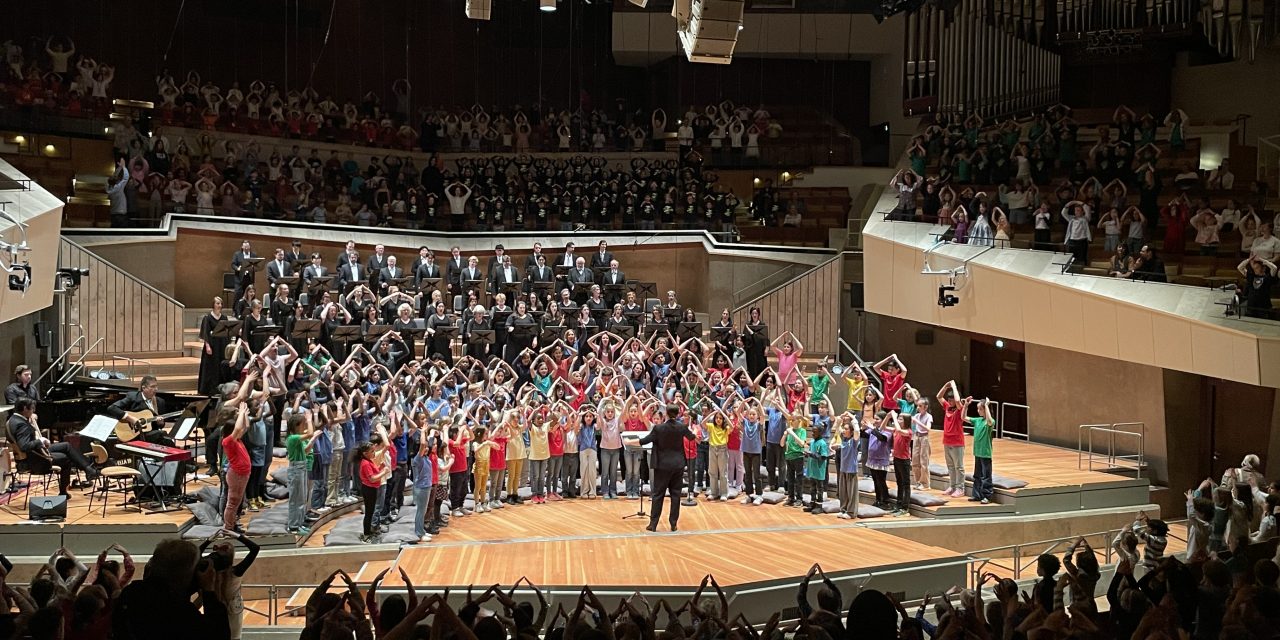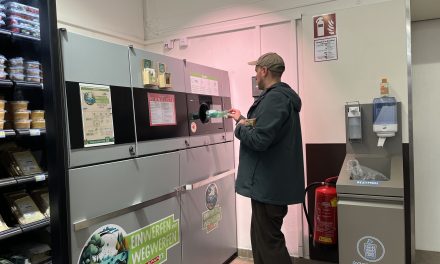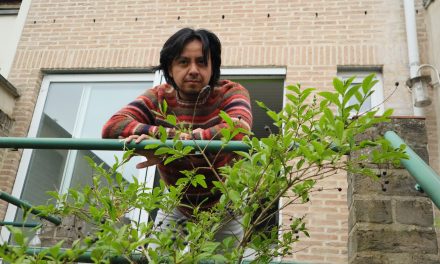Berlin’s Budget Cuts Threaten Future of Children’s Educational Program
Soft and excited, impatiently waiting, children’s voices echo through the Berliner Philharmonie. They wait for the Liederbörse, an annual concert presented by SING!, a school-based choral education program run by Rundfunkchor Berlin. But behind the joyful noise laid a quieter tension. With recent cultural budget cuts from the Berlin Senate, the future of SING! now is unclear.
This afternoon in April, the main hall of the Berliner Philharmonie is alive – not with the polished sounds of a professional symphony, but with the layered voices of 800 children.
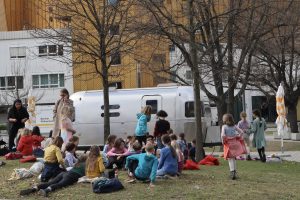
Children are waiting for the Liederbörse in front of Philharmonie Berlin.
When asked what their perfect city would look like, the childrens answers came quickly. “An ice cream shop!” “Chips!” “Strawberries! A football field! A rollercoaster!” The audience laughed.
SING! choirs and Rundfunkchor Berlin singing together (Song: “The River is Flowing”)
The theme of this year’s Liederbörse “City, Country, River” posed a question with complicated undertones: How, and where, do we want to live? A question made even more urgent by the Berlin Senate’s announced budget cuts – disproportionately targeting the cultural sector.
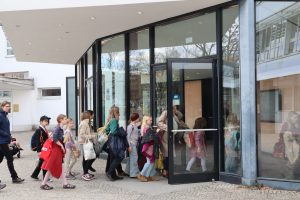
Children entering Philharmonie Berlin.
Since 2011, SING! has brought weekly singing into schools across the city, especially those with limited access to music education. Fifteen schools and roughly 330 children are currently part of the program.
SING! was never intended to replace proper music education. “Ideally, music pedagogy would be part of every teacher’s university training. But it isn’t,” Rachel Sophia Dries, director of the Rundfunkchor Berlin says. “It’s not really our job to patch holes in education policy. But we recognized the need, and we stepped in.”
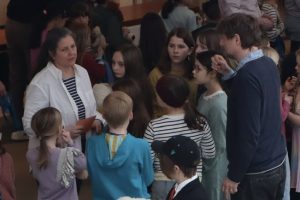
Children chatting with teachers before the concert.
The model is simple and efficient: 45 minutes of weekly coaching per teacher, paired with long-term support. Over three years, one trained teacher can reach hundreds of students. But the program’s future is now in doubt.
In November 2024, Berlin’s Senate announced €3 billion in budget cuts. With culture, bearing €130 million of that. SING!, which relied heavily on public support, was abruptly and completely cut.
“No discussion, no warning,” recalls Dries. She wasn’t consulted. The notice came from a random civil servant, six weeks before funding ran out. Since then, the choir responded with open letters, petitions, and public appeals.
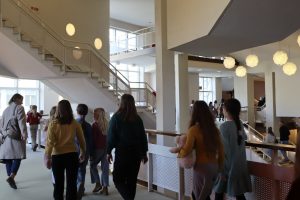
Children in Philharmonie Berlin.
Sabrina Friedrich, a SING! choral coach since October 2021, moves from school to school, helping children and teachers discover their voice through song.
“At first, it’s challenging, some children speak languages I don’t speak,” Friedrich admits. “But learning the melodies, hearing the textures… The kids see themselves as part of something bigger.”
The transformation, she says, is often quiet but powerful: A shy child singing louder than expected. A class divided by language or background discovers unity in rhythm and melody.
“It’s like magic,” Friedrich says. In her opinion music isn’t just notes. It’s community. It teaches social skills. Listening as much as singing.
Sabrina Friedrich talking about the significance of singing together.
Martin Schwarze, a music teacher at Grundschule am Koppenplatz, remembers what the school’s music program looked like before SING!.
“Three teachers for 800 students. Most lessons were taught by colleagues with no music background. They filled in worksheets, but no one made music.”
His own mother sings in the Rundfunkchor. Inspired by that, he applied for SING! in hope of bringing more music to the school. Every Tuesday, he now comes together with other teachers to practice rhythm, conducting and a bit of piano.
“The hardest part for non-musicians is to start,” he says. “But once they do, their eyes change. They realize they can contribute something beautiful and be part of a bigger thing.”
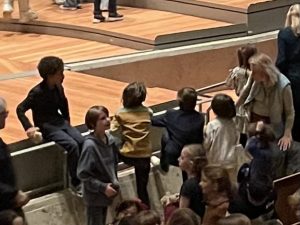
Children before the concert.
One Ukrainian student arrived barely speaking German. “She made friends. She became visible,” Schwarze says. Another student now dreams of becoming a professional singer. “For his parents, who rarely go to concerts, the Liederbörse was the first time they saw that could be real and not just a dream.”
Dries sees stories like these as the heart of SING!’s impact. “Singing strengthens self-esteem,” she says. “People who sing have a stronger presence in front of others.” It’s that intangible confidence she hopes decision-makers won’t ignore.
In the Philharmonie, for many children, that concert was their first time on a professional stage. “They looked around and thought: We are such a big group. This is me, too,” Schwarze recalls.
Sabrina Friedrich about the “magic” of singing together.
When the moderator mentioned the funding cuts, the children booed loudly. First donations have extended the program into May. But beyond that, there are no guarantees. “We’ve bought some time,” Dries says. “But we don’t know how long it will last.”
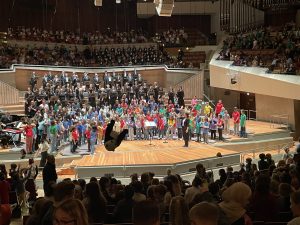
Children throwing their teddy bears during the concert.
Behind the scenes, efforts to secure alternative funding are underway. “And as it turns out, we’re not even that unsuccessful,” Dries says. “This just shows how important it is to speak up loudly when something like this happens.”
Photos by Julia Kaffka (April 8th, 2025)
